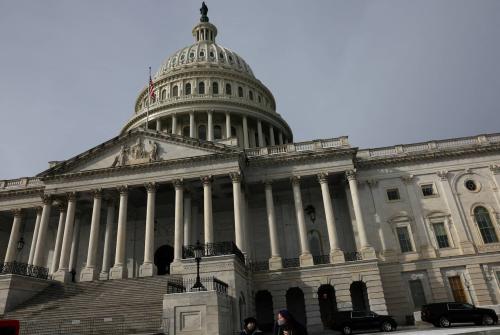A group of lawmakers, budget analysts, and congressional budget staffers from both sides of the political aisle took an in-depth look at the U.S. budget outlook today and laid out the difficult and politically unpopular measures that will be needed in order to achieve fiscal balance. Currently, the United States faces deficits of more than half a trillion dollars a year over the next decade, and some economists believe that current economic policies and the retirement of the baby-boom generation could make the situation even bleaker.
Panelists spoke at a forum on Capitol Hill co-sponsored by the Brookings Institution and the Heritage Foundation. Although most panelists agreed that current and projected deficit levels were high, opinions differed not only on how to reduce the deficits, but also on the severity of the current situation.
Brookings Senior Fellow Isabel Sawhill called the deficit “very serious,” and Senior Fellow Alice Rivlin said it was “the problem that wouldn’t go away.” Both contributed to Restoring Fiscal Sanity, a new Brookings book arguing that large federal deficits have the potential to slow economic growth, reduce household incomes, raise interest costs, and impose enormous burdens on future generations. The book provided three options for balancing the budget, each designed to appeal to a particular political philosophy:
- A “Smaller Government Plan” that advocated less spending by scaling back business subsidies, restricting entitlements, passing financial burdens on to the states, and reducing federal “pork.”
- A “Larger Government Plan” that relied on tax increases to sustain government activity and the implementation of new spending initiatives in order to balance the federal budget by 2014.
- A “Better Government Plan” that called for improved government efficiency and effectiveness through a combination of compromised spending cuts and revenue increases that would make government more efficient through the reallocation of expenditures.
Representative Jim Nussle (R-Iowa) argued that the current deficits had served a useful purpose and he warned against narrowly focusing on achieving a balanced budget. “These deficits were deliberate and they have been successful,” said Nussle, who chairs the House Budget Committee. “We have, as a result of these deficits, been able to protect the country in the short term, successfully prosecute a war against global terrorism that is ongoing, and successfully stimulate the economy back to health?Having a balanced budget on September 10, 2001 didn’t get us anywhere. It didn’t protect the country.”
Nussle also argued that the road to fiscal balance did not require drastic spending cuts or tax increases, but could be achieved through the kind of economic growth he believed was already happening and would continue thanks to President Bush’s tax cuts. Nussle predicted that current productivity growth could halve the federal deficit in “as early as three to four years”—a prediction that exceeds even the best expectations of the Bush administration.
Sawhill recognized the potential of productivity growth to eliminate deficits, but said it was “fiscally irresponsible to count on growth to get us out of the hole….Some kind of plan is needed to move us gradually toward balance over the next decade.”
Representative John M. Spratt, Jr. (D-S.C.) agreed that economic growth would significantly ease the current shortfall, and he cited the budget-balancing boom of the 1990s as a precedent. However, he said a good economy could only reduce federal deficits if a strong federal budget was in place, and he said the Bush administration has yet to present such a plan.
“The Bush budget put forward this year basically treads water,” Spratt said. “There’s a choice being made right now in the policies we’re implementing…We’re choosing tax cuts over the solvency of Medicare and Social Security right now.”
Stuart Butler, vice president for domestic and economic studies at the Heritage Foundation, suggested that current deficit levels weren’t as bad as they appeared, noting that the federal deficit as a percentage of Gross Domestic Product is consistent with historical levels. He also worried that some panelists were failing to consider the complex nature of the U.S. economy.
“Eliminating deficits has economic consequences as well,” Butler said. “If we raise taxes to reduce the debt, that has an effect on investment and incentives, among other things. If we try to reduce the deficit through spending reductions, that also has effects on the economy. It’s not a question of saying ‘Here’s the problem and whatever we do will be benign with regard to the rest of the economy.’”
All panelists agreed that the federal government had to change how it spent taxpayer’s money. Rich Meade, majority chief of staff for the House Budget Committee, applauded congressional efforts to freeze funding for non-security needs and said there was a broad consensus to examine potential savings from mandatory programs.
House Budget Committee Minority Staff Director Thomas Kahn called for the reinstatement of pay-as-you-go (PAYGO) rules that required legislators to offset spending proposals with tax increases and vice versa. PAYGO rules expired in 2002 and have yet to be reinstated.
William Hoagland, director of budget and appropriations for Senate Majority Leader Bill Frist (R-Tenn.), said the problem of federal deficits was due, in part, to the expectations of the American people.
“We have to change our fundamental talking points from ‘wants’ to ‘limits,’” Hoagland said. “We have become a country that expects and want and yet there are limits as we all know.”
Bill Dauster, minority deputy staff director and general counsel on the Senate Finance Committee, said that President Bush’s decision to go to war with Iraq has deepened U.S. economic woes and was part of the President’s “deficit insanity.”
“The government’s choice to go to war with Iraq is looking as sane as smacking a hornet’s nest with a baseball bat.” Dauster said. “When it comes to wars of choice we must take into account the cost in lives and treasury.”



Commentary
Op-edEvent Summary: Restoring Budget Sanity
April 27, 2004